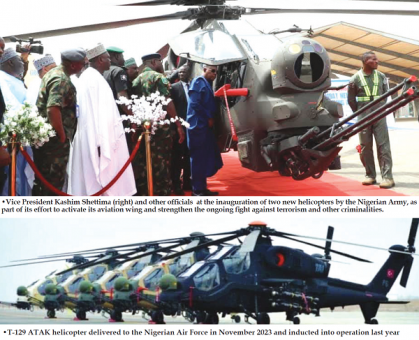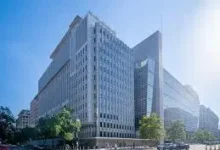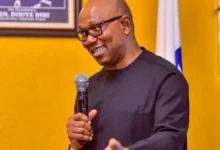Tinubu’s security scorecard: Key gains, emerging challenges

When President Bola Ahmed Tinubu took the oath of office on May 29, 2023, Nigeria was staggering under the weight of a full-blown security crisis. Across the country, violence had become tragically routine. From rural communities in Zamfara to urban centres in Imo, bloodshed was no longer breaking news—it was daily life. Terrorists, kidnappers, bandits and armed militias moved with terrifying audacity, often outgunning security forces and crippling local economies in the process.
Insecurity had metastasised. Nigeria, by mid-2023, was not just dealing with isolated violence—it was navigating a national emergency. Data from independent monitoring groups showed that between June 2020 and April 2023, at least 12,576 Nigerians were killed and another 7,226 abducted in over 3,300 violent incidents. No geopolitical zone was spared. While the North reeled from terrorism, banditry, and cattle rustling, the South grappled with separatist violence, oil theft and cult-related killings. Women and children became frequent victims, communities were displaced, and trust in the state was badly eroded.
President Tinubu, inheriting this fractured security landscape, wasted little time. In his inaugural address, he was unequivocal: “Security shall be the top priority of our administration because neither prosperity nor justice can reign in the face of chaos.” In less than a month, he replaced the nation’s entire security leadership, appointing men seen as competent, modern-minded and mission-ready. The new security helmsmen—led by National Security Adviser Nuhu Ribadu and Chief of Defence Staff General Christopher Musa—were handed a clear brief: restore public confidence, rebuild coordination among agencies, and take the fight to the enemies of the state. This shift was not merely cosmetic. Operational strategies were recalibrated. Joint task forces were reinforced. Technology began playing a larger role in intelligence gathering. A renewed emphasis was placed on inter-agency cooperation—an area where previous administrations had failed spectacularly. New efforts emerged to tackle kidnapping along expressways, flush terrorists from forest enclaves, and engage local vigilantes more constructively.
Nigeria’s security landscape remains fraught with danger—but not without signs of course correction. Fresh data from multiple credible sources paints a nuanced picture: a country still grappling with widespread violence, yet gradually stepping away from the abyss it teetered on before May 2023. According to Beacon Consulting, 13,346 people lost their lives and 9,207 were abducted in violent incidents across Nigeria between May 2023 and September 2024. However, figures obtained from NEXTIER Nigeria’s Violent Conflict Database offer a more conservative, albeit troubling, count: 6,751 people killed and 4,068 kidnapped in 1,938 incidents spanning from May 29, 2023, to May 7, 2025.
Broken down further, the NEXTIER data suggests that violence peaked in 2024, with 3,134 fatalities and 2,562 kidnappings across 916 incidents. In contrast, 2023 witnessed 2,362 deaths and 674 incidents, while the first four months of 2025 recorded a notable decline—1,255 fatalities and 495 kidnappings from 348 incidents. This drop suggests early returns from new strategies deployed under Tinubu’s administration, including leadership overhauls, tactical reorganisation, and renewed inter-agency collaboration. Regionally, the North Central emerged as the epicentre of violence with 2,628 deaths and 1,026 kidnappings from 608 reported incidents. The Northwest trailed closely, reporting 2,071 casualties and 2,326 abductions from 478 incidents. In contrast, the relatively calmer Southwest recorded 255 deaths and 209 kidnappings from 188 incidents. The Northeast, long a theatre of insurgency, logged 868 deaths and 177 kidnappings.
A breakdown by the nature of violence shows that banditry remains Nigeria’s deadliest scourge—2,662 casualties and 2,773 kidnappings across 534 incidents. Gunmen attacks came next, with 1,255 deaths and 1,042 kidnappings from 657 attacks. Farmer-herder clashes, cult-related violence, secessionist agitations, and terrorism continued to inflict damage across multiple fronts, albeit with reduced intensity compared to the pre-2023 period.
One of the administration’s earliest moves was addressing long-standing systemic challenges within the nation’s security architecture. These included chronic underfunding, outdated equipment, low troop morale, intelligence gaps and poor inter-agency coordination. The Tinubu government significantly raised the national defence allocation from N1.25 trillion in 2023 to N3.25 trillion—a 160% increase—making up roughly 12% of the N27.5 trillion national budget. In 2025, the defence budget soared again to N4.91 trillion, reflecting Tinubu’s commitment to a robust and responsive security system.
Beyond funding, the administration also approved harmonised salary increases for security personnel and authorised annual recruitment drives to expand the nation’s under-resourced forces. The Nigeria Police, for instance, saw its annual recruitment quota jump from 10,000 to 30,000—an essential step in combating urban crime and improving community policing. Recognising that force alone cannot solve deep-rooted insecurity, the administration also pursued broader, systemic reforms. These included initiating discussions around constitutional amendments to enable the creation of state police, establishing a regulatory body to tackle the proliferation of small arms and light weapons, and launching economic buffers such as conditional cash transfers aimed at reducing the socio-economic vulnerabilities that feed into crime.
The results have been tangible. Security forces executed more frequent and successful clearance operations across all major conflict theatres. In the northeast, over 3,496 insurgents were neutralised and more than 121,000 terrorists and their family members surrendered to the military—a record figure in Nigeria’s counterinsurgency efforts. Nationwide, over 30,000 suspects were arrested across operations targeting bandit camps, kidnappers’ dens, and terror cells. Perhaps the most telling indicator of progress is the return of displaced persons to over 100 previously terrorised communities. In these areas, farming activities have resumed, and normal life is gradually being restored—an encouraging sign that under Tinubu, Nigeria is not only fighting back but starting to reclaim its lost spaces.

Modernising security infrastructure for a smarter, stronger defence system
A cornerstone of President Tinubu’s security policy has been the modernisation of Nigeria’s defence and internal security apparatus. Over the past two years, the administration has made unprecedented investments in advanced weaponry, cutting-edge surveillance systems, and force multipliers to elevate operational efficiency across the armed forces and law enforcement agencies.
The renewed emphasis on hardware acquisition has significantly altered the tactical landscape. Security agencies—particularly the military, police, and Department of State Services—have been equipped with high-grade arms and assault platforms. These include Mine-Resistant Ambush Protected Vehicles (MRAPs), drones, attack helicopters, surveillance towers, and next-generation rifles. The Nigerian Air Force alone has received nine new aircraft and anticipates the delivery of an additional 49, reinforcing its air power in counterinsurgency and reconnaissance missions. This expanded arsenal has proven vital in neutralising threats and extending state presence into previously ungoverned territories.
Complementing the hardware boost is a bold embrace of technology. The Tinubu administration has pushed for intelligence-led operations powered by digital tools. Real-time surveillance systems now allow security agencies to monitor activities across strategic zones. The Office of the National Security Adviser (ONSA) is equipped with a national security grid that provides an integrated view of threats across the federation, enhancing both inter-agency coordination and preventive responses. Further strides have been made in adopting Artificial Intelligence (AI) for predictive threat analysis, battlefield logistics, and incident mapping. This digital upgrade, while still in its early stages, positions Nigeria to transition from reactive to proactive security enforcement. The administration has also demonstrated innovation by creating the Mines Marshal Corps—tasked with securing mining sites and disrupting illicit mineral trade often linked to armed groups.
In tandem with kinetic and technological solutions, the government has deployed targeted community engagement initiatives. One example is the Pulako Initiative, launched with a N50 billion commitment. The programme targets seven northern states with the aim of resolving long-standing conflicts between herders and farmers. It combines security with social investment—focusing on conflict mediation, rebuilding affected communities and restoring economic livelihoods. These multi-layered interventions signal a shift from a fragmented security approach to a more integrated and intelligence-driven framework. While challenges remain, the Tinubu administration has laid a robust foundation for a smarter, better-equipped and more agile security system capable of evolving with Nigeria’s complex threats.
Renewed wave of violence threatens security gains
Just as Nigerians began to breathe a collective sigh of relief following improved security measures, a resurgence of deadly violence has shaken several regions, reigniting fears and casting shadows over earlier progress. Terrorist groups, emboldened and re-strategised, have launched a new wave of attacks—targeting military installations, killing civilians and security personnel, and looting weapons from vulnerable outposts.
Security analysts point to an influx of militants from neighbouring Cameroon and the Lake Chad Basin who are exploiting Nigeria’s porous borders and ungoverned spaces. These infiltrators, familiar with the rugged terrains, have wreaked havoc on sleeping communities across Borno, Yobe, Benue, and Plateau states. Observers have offered varied explanations for the renewed violence. Some suggest it may be politically motivated—an orchestrated campaign by desperate actors aiming to destabilise the country ahead of the next general elections. Others cite systemic security challenges, including lapses in leadership, poor interagency coordination, and overstretched personnel suffering from battle fatigue. Climate change, illegal mining, resource competition, and an ineffective recruitment system are also believed to be fuelling the crisis.
Particularly concerning is the redeployment of military assets from the Northeast to the Northwest in the fight against banditry. This shift, analysts argue, created a security vacuum in parts of Borno and Yobe, allowing insurgents to regroup and reclaim lost territories. Reports suggest that Guzamala, Kukawa, and Abadam LGAs in Borno are now under near-total control of terrorists, while Marte, Monguno, and Kala Balge LGAs face growing militant presence. Recent bombings in Damboa and Gwoza point to the resurgence of Boko Haram. The scale of brutality has intensified. In one incident, 26 civilians were killed in a Boko Haram bomb attack on a bridge between Rann and Gamboru Ngala. That same day, the group attacked mourners at a funeral in Chibok’s Koful village, killing seven and razing homes and churches. In Benue, criminal herders have taken over border communities in Kwande LGA, displacing farmers despite military presence. Similar scenes have unfolded in Logo LGA, where entire villages have been sacked.
Disturbingly, insurgents are now deploying more advanced tactics, including the use of drones and landmines, and have resumed hoisting flags in captured communities—an ominous symbol of renewed control. Meanwhile, communal clashes in the Middle Belt have surged. In April alone, hundreds were killed in Plateau and Benue states, evoking painful memories of the December 2023 attacks that claimed nearly 200 lives in Plateau. These developments underscore a mounting humanitarian crisis and signal the urgent need to reinforce Nigeria’s fragile security architecture.
Security analysts prescribe urgent reforms to sustain gains and avert reversal
Security experts have offered insights into how the Tinubu administration can consolidate recent gains and overcome persistent threats. Among them is retired Major-General Chris Olukolade, former Defence Spokesman, who believes that President Bola Tinubu has demonstrated a more compelling political will than his predecessor—a factor critical to inspiring improved performance from the nation’s security architecture. Olukolade noted that under the Buhari administration, a lack of clear direction and an over-reliance on ambiguous “body language” stifled decisive security actions. This inaction, he argued, allowed terrorism to metastasize across the country, eroding public trust and fueling sentiments like those expressed by General T.Y. Danjuma, who once accused security forces of collusion and urged citizens to defend themselves.
“The Tinubu government still has a lot to do to convince Nigerians that its approach will be markedly different from Buhari’s apparent deliberate inaction. The widely acknowledged stronger political will must translate into tangible action—one that adequately motivates and equips security forces to produce lasting, measurable results,” Oluk]olade warned.
Echoing this view, Dennis Amachree, a former Director at the Department of State Services (DSS), acknowledged the increase in defence budgets and noted visible military engagements across theatres, including counter-banditry operations and the Navy’s fight against oil theft. However, he also highlighted lingering issues related to operational effectiveness and civilian protection. Amachree called for a multi-pronged approach, beginning with enhanced training, better equipment, and improved intelligence capabilities for all security services. He stressed the importance of better coordination, particularly under the Office of the National Security Adviser (ONSA), which should function as the central node for inter-agency collaboration. “The restructuring and reorientation of security agencies towards a people-centric approach is essential,” he said, advocating for greater accountability, transparency, and zero tolerance for corruption or human rights abuses.
Amachree also underscored the urgency of addressing border vulnerabilities—especially in the North—through modern surveillance technologies and comprehensive monitoring systems. He reiterated the need for police decentralisation, including the establishment of State Police, and the strengthening of community policing structures to build public trust and improve intelligence gathering at the grassroots. “In conclusion,” Amachree noted, “the Tinubu administration must urgently prioritise technological border surveillance and commit to the creation of state police forces. Only then can Nigeria begin to tackle its complex and evolving security challenges with the depth and resolve they require.”
Counter-insurgency expert Bulama Bukarti has strongly condemned the increasing attacks on military bases, describing them as a troubling escalation in the terrorists’ operational boldness and a direct challenge to the authority of the state. In a post on his verified X account, Bukarti warned that these assaults not only undermine the readiness and morale of security forces but also send a dangerous message of vulnerability to both the public and potential insurgents. “Such attacks are a serious blow to national security, destabilize efforts to restore peace, and diminish public confidence in the government’s ability to protect its citizens and preserve territorial integrity,” Bukarti explained.
He called for an urgent overhaul of the country’s counterinsurgency strategy to address this mounting threat. According to Bukarti, this should involve a focus on intelligence-driven operations, fortifying military outposts, boosting troop welfare and logistics, and enhancing coordination among security agencies. Above all, he emphasised the importance of sustained political will and adequate resourcing to combat and ultimately defeat the growing insurgent threat. “The frequency of these attacks, which have become almost daily, is alarming,” Bukarti noted. “When violence escalated in Borno in 2011 and 2012, it rapidly spread across northern Nigeria, causing massive destruction and immense harm. The recent uptick in violence spilling over into Adamawa State is deeply concerning.”
Reports indicate that Boko Haram militants are regrouping in the Tumbus area of Lake Chad and the Mandara Hills within the Sambisa Forest, signaling an alarming resurgence. Bukarti warned that allowing terrorists to operate freely in these areas only strengthens their capacity to plan and execute attacks. “The security forces must stop waiting to defend and instead take the battle directly to Boko Haram’s strongholds. This requires the swift deployment of additional troops to the Lake Chad Basin and Sambisa Forest, supported by air surveillance and enhanced waterborne capabilities. Intelligence networks at the local level need to be revived and strengthened to detect early signs of insurgent recruitment and planned attacks,” Bukarti said. He concluded with a stark reminder: “If decisive action is not taken now, Boko Haram’s threat will continue to grow. As the saying goes, a stitch in time saves nine.”
In an exclusive interview with Security Watch Africa, security expert Dr. Kabir Adamu identified a critical flaw in Nigeria’s national security approach: the lack of engagement with the public. He pointed out that the masses have not been sufficiently informed or involved in the country’s national security strategy, leaving them unsure of how to report suspicious activities, such as the presence of wanted terror suspects. “We have not adequately involved the people in our national security strategy. The primary responsibility of the coordinator of our national security strategy should be to engage the public, starting with governors,” Dr. Adamu explained. “They should ensure that governors understand the strategy, appreciate its goals, and then work together to spread this knowledge to other stakeholders until it reaches the grassroots level.”
Dr. Adamu emphasised that understanding the content of the key national security instruments is crucial. He highlighted three core documents that guide Nigeria’s counterterrorism efforts: the National Counterterrorism Strategy, housed within the Office of the National Security Adviser (ONSA); the Policy Framework on Countering Violent Extremism, also under ONSA; and the Terrorism Prohibition and Prevention Law, for which the Attorney General of the Federation holds primary responsibility. Other government officials, including those in defence, police affairs, and interior ministries, also have roles in implementing these policies. “The goal of these three documents is clear: to block terrorist funding, curb recruitment efforts, and prevent the generation of weapons by non-state actors,” Dr. Adamu explained. “To make this work, the security strategy needs to be clearly communicated to governors, who can then ensure its broader dissemination to the public and other stakeholders.”
On the potential use of Private Military Contractors (PMCs), Dr. Adamu suggested that Nigeria should focus on harnessing the expertise of its own private security sector, rather than relying on international contractors. “The idea of engaging international Private Military Contractors is often what comes to mind, but we must not overlook the vast potential within Nigeria’s private security sector. The last time we conducted a survey, we found that Nigeria’s private security sector employs around three million people directly, and including indirect employment, that number could be as high as ten million. This sector is massive and holds capabilities that could support public security efforts, particularly in intelligence gathering.”
He continued, “While it’s true that private security companies in Nigeria cannot bear weapons, there are still opportunities for them to support operations, particularly through intelligence work. There are retired military personnel within the sector who have already contributed to security operations, especially in the Northeast.” Dr. Adamu proposed that the government assess the gaps in current security strategies and consider integrating resources from the private security sector. He also suggested that discussions around weapon licensing for private security companies should be revisited to allow them to play a more significant role in supporting the national security apparatus. “Perhaps it is time we considered licensing weapons and other necessary capabilities for the private security sector, so they can adequately support public security efforts,” he concluded.





